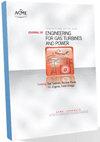Development of a Hydrogen Micro Gas Turbine Combustor: Atmospheric Pressure Testing
IF 2.1
4区 工程技术
Q3 ENGINEERING, MECHANICAL
Journal of Engineering for Gas Turbines and Power-transactions of The Asme
Pub Date : 2023-10-10
DOI:10.1115/1.4063708
引用次数: 0
Abstract
Abstract In the H2mGT project, funded by the German BMWK, a micro gas turbine (mGT) burner with 100% hydrogen firing is developed and validated. The project is a collaboration between TUB and the manufacturer Euro-K GmbH. It consists of three phases: 1. Atmospheric pressure tests with optical access; 2. Atmospheric pressure tests with secondary air injection; 3. Validation of the burner in the mGT. This paper will present the results of Phase 1. The hydrogen burner is based on a swirl-stabilized burner of TUB. The burner design features multiple geometrical parameters to enable the optimization towards low NOx emissions. Therefore, a variable swirl intensity, additional axial momentum of air in the mixing tube, a movable center-body and different fuel injection locations are implemented. Phase 1 investigates the parameter space in terms of flame stability, operational range and parameter impact on flame shape and emissions. It is found that the flame can be operated over a large range of equivalence ratios and preheating temperatures up to 500°C for many parameter settings. However, at some geometries flashback into the mixing tube is triggered. As expected, the NOx emissions are mainly influenced by the equivalence ratio, the fuel distribution, and the swirl intensity. Single digit emissions are reached up to an equivalence ratio of 0.4 at atmospheric pressure conditions. Furthermore, the burner can be operated at 100% natural gas or 100% hydrogen without any geometry changes without a significant change in NOx emissions.氢微型燃气轮机燃烧室的研制:大气压力试验
在德国BMWK资助的H2mGT项目中,开发并验证了一种100%氢气燃烧的微型燃气轮机(mGT)燃烧器。该项目是TUB和制造商Euro-K GmbH之间的合作项目。它包括三个阶段:1。带光学通道的大气压试验;2. 二次空气喷射大气压试验;3.mGT中燃烧器的验证。本文将介绍第一阶段的结果。氢气燃烧器是在涡流稳定燃烧器的基础上研制的。燃烧器设计具有多个几何参数,以实现低氮氧化物排放的优化。因此,实现了可变旋流强度、混合管内空气附加轴向动量、可移动中心体和不同喷油位置。第一阶段从火焰稳定性、工作范围和参数对火焰形状和排放的影响等方面研究参数空间。研究发现,对于许多参数设置,火焰可以在大范围的等效比和预热温度下运行,预热温度可达500°C。然而,在某些几何形状处会触发回闪进入混合管。正如预期的那样,NOx排放主要受等效比、燃料分布和涡流强度的影响。在大气压条件下,单位数排放量达到0.4的等效比。此外,燃烧器可以在100%天然气或100%氢气的情况下运行,没有任何几何形状的变化,也不会显著改变氮氧化物的排放。
本文章由计算机程序翻译,如有差异,请以英文原文为准。
求助全文
约1分钟内获得全文
求助全文
来源期刊
CiteScore
3.80
自引率
20.00%
发文量
292
审稿时长
2.0 months
期刊介绍:
The ASME Journal of Engineering for Gas Turbines and Power publishes archival-quality papers in the areas of gas and steam turbine technology, nuclear engineering, internal combustion engines, and fossil power generation. It covers a broad spectrum of practical topics of interest to industry. Subject areas covered include: thermodynamics; fluid mechanics; heat transfer; and modeling; propulsion and power generation components and systems; combustion, fuels, and emissions; nuclear reactor systems and components; thermal hydraulics; heat exchangers; nuclear fuel technology and waste management; I. C. engines for marine, rail, and power generation; steam and hydro power generation; advanced cycles for fossil energy generation; pollution control and environmental effects.

 求助内容:
求助内容: 应助结果提醒方式:
应助结果提醒方式:


